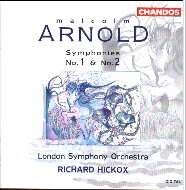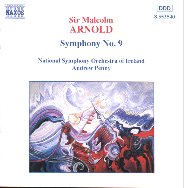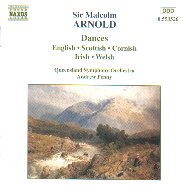These are première recordings made in 1991. Arnold's Seventh Symphony
is his bleakest. Its anger reminds one of that of the first three movements
of Walton's First Symphony but unlike that work, where one senses the anger
is controlled and directed, this fury at length screws up into hysteria.
But the Walton connection is strong because there is also something of Walton's
wicked wit and harsh brilliance in this music and, in fact, it was finished
at Walton's home on the Island of Ischia in September 1973. The work is dedicated
to Arnold's children, Katherine, Robert and Edward. The CD's note writer,
Piers Burton-Page, comments, "The composer explained at the time of the first
performance, that each was loosely portrayed in one of the movements. Cryptic,
because this symphony nevertheless has outbursts of orchestral ferocity
unequalled elsewhere in his output and one suspects - unless these are portraits
of savage cruelty - that this laconic explanation goes only part of the way
to explaining the music's meaning."
The symphony opens in anarchy with a heavy tread, screeching strings and
pungent, angry, brass staccatos, then "oompah-oompah" brass chords and impish
twittering woodwinds. The tempo then relaxes but the mood darkens, with pleading
and despairing strings wanting, one feels, to flower into some sort of lyricism
but they are brusquely thrust aside by the oompah brasses.
Later we hear some particularly sickeningly grotesque jazz and an angry episode,
like so many frenzied bees buzzing before furious bass-drum hammerings break
in. A hollow-sounding, totally despondent Mahlerian cowbell summons the closing
of this long, uncomfortable movement. The second movement is dominated by
a solo trombone intoning disillusionment over mournful strings. Later there
is an extended passage for untuned percussion which Piers Burton-Page thinks
might be connected with Arnold's tragically autistic son, Edward. This cold,
empty, hammering, which increases and decreases in sound and intensity, is
heard over tremolando strings before the tempo increases rapidly until we
reach the hysteria we had met in the first movement. The sombre pessimistic
ending of this movement contrasts with the sardonic forcefulness of the finale
in which Arnold apes the music of the Irish group, The Chieftains. The cowbell
halts return of darker figures, to allow some chink of hope before the work
ends.
The shorter Eighth Symphony is again harsh, although the prevalent temperament
is somewhat lighter. The first movement carries many moods from brooding
drama and conflict, to lyricism and comic pomposity. Music from one of the
last films he scored, The Reckoning, is used - an attractive, jaunty
Irish marching tune. The second movement is elegiac but with bleak desolate
wind solos and the finale has a quicksilver brilliance with a welcome xylophone
solo that is bright and light.
Vernon Handley and the RPO are superb, meeting all the tricky challenges
of these complex works in terms of rhythm, articulation, intonation and precision
of ensemble.
Reviewer
Ian Lace
tar.gif)
Notes on Arnold from Len Mullenger
For thirty or so years, I have been attending Recorded Music Societies
(Gramophone Societies as we used to call them) and other musical events,
and for most of that time, I cannot recall Malcolm Arnold being treated seriously
as a composer. When I presented a programme to celebrate his 75th birthday
in 1996, I asked 'Is his music loved?' 'Is he a great composer' (and hoped
I could demonstrate that he was) and I then challenged my audience by demanding
to know how they felt about the fact that it was his 75th birthday. Did they
feel anything at all? Rumble, rumble round the room.
I think that for most people Arnold is something of an enigma. He seems to
be a parochial composer, and often inward -looking at that; perhaps
his music does not travel - for instance, I could not find a single mention
of Arnold in any of Andrew Porter's books of concert reviews. The music of
Elgar and Walton has certainly travelled abroad, and that is loved. Perhaps
for rather fewer of us, so is the music of Alwyn - but I fear that few love
the music of Arnold. He is recognised by my musical friends as a composer
of some good music, even funny music (Tam 'O Shanter and the music for the
Hoffnung Festivals) and of course his major contribution was regarded as
being a film music composer, which probably damned him in the eyes of the
less enlightened musicophiles - so his music is admired rather than being
loved. For most of that time I cannot pretend to have been much different.
I loved the English Dance suites but gradually became aware that there was
a darker undercurrent in Arnold's music, as exhibited in some of the other
Dance Suites, which have gradually become more introspective, reflecting
at times, the disillusionment he felt with his own life as well as the depravity
the English wrought on the three Celtic nations. I suspect that, like Bax,
Arnold regards himself as a Celt at heart. There is not much that is carefree
or life-enhancing in the first of the Scottish Dances. The andantino in the
Cornish Dances has whistfullness, regret and melancholy, bringing memories
of the gaunt chimney stacks and relics of stone pumping houses that still
remain throughout parts of Cornwall. It might be expected that the Irish
dances would be more lively - but they too are permeated with a feeling of
loss.On hearing the Welsh dances we are inhabiting a different mind-set.
There is little jollity here; the music is desolate, hard, harsh, numbing
, unrelenting and even threatening - in spite of the dance rhythms.
The core of Arnold's output is the symphonies - and how familiar are
they? They are all different and a pretty tough, uncompromising lot
some of them are. Arnold is a great tunesmith and the one symphony that may
lay claim to being loved was the Fifth symphony. It has such a marvellous
tune in the slow movement, fully worthy of Alwyn or Walton. But listen to
what happens when it reappears in the finale. Arnold completely destroys
it like a spoilt child in a moody temper or perhaps something deeper even
than that. We remain perplexed. The symphony received mixed reviews on its
first performance. Jeremy Noble called it 'a jolly neo-romantic confection
about which the less said the better' - clearly it was that tune that stayed
in his mind. The anonymous Times reviewer said it 'suggested an active
personality in an advanced state of disintegration'. I must quote Christopher
Palmer more fully, regarding the finale:
'In the slow movement there is this great, glorious tune, just too beautiful,
too pristine, too perfect, like a fashion model. This is a paragon of a tune
- and make no mistake it is a wonderful tune, all set to return in fortissimo,
full-orchestra triumph, as the culmination of everyone's hopes and dreams
and aspirations, when, deliberately and cynically and cold-bloodedly, he
trashes his tune, destroys his own beautiful creation. Magnificent shining
edifice one moment: blackened, smoking ruin, E-minor ash, the next.'
But even in the big tune in the slow movement there are glimpses of sadness
and despair. In a BBC review it reminded Arthur Peacock of a marble
tombstone, bearing an inscription of consoling texts - but slowly the lid
of the tomb slides back and the horror within can be glimpsed.
 I
believe all Arnold symphonies, and much of his other music, is autobiographical
and we are allowed to see this 'horror within'. Arnold has not always loved
himself which is possibly why it is so difficult to love his music. Yet,
like Mahler or Shostakovich, he is willing to face up to himself in his
symphonies. He went through years of depression, had personal and family
health problems, became an alcoholic and after the failure of his second
marriage became suicidal. It is all there in the music and that is
why his music is so powerful, personal and moving. The unremittingly intense
and sinewy seventh symphony, reviewed by Ian above, seems to me to represent
the composer at the depths of this great despair and he is hammering at the
inside of his skull to escape it - use is made of the cow-bell in ways Mahler
never imagined. This sombre seventh symphony has to be played in an empty
house at full volume and I promise you that it will remain with you for weeks
I
believe all Arnold symphonies, and much of his other music, is autobiographical
and we are allowed to see this 'horror within'. Arnold has not always loved
himself which is possibly why it is so difficult to love his music. Yet,
like Mahler or Shostakovich, he is willing to face up to himself in his
symphonies. He went through years of depression, had personal and family
health problems, became an alcoholic and after the failure of his second
marriage became suicidal. It is all there in the music and that is
why his music is so powerful, personal and moving. The unremittingly intense
and sinewy seventh symphony, reviewed by Ian above, seems to me to represent
the composer at the depths of this great despair and he is hammering at the
inside of his skull to escape it - use is made of the cow-bell in ways Mahler
never imagined. This sombre seventh symphony has to be played in an empty
house at full volume and I promise you that it will remain with you for weeks
 after
that!
after
that!
At this very moment Rob Barnett is preparing a biographical article on Malcolm
Arnold which will appear on the Arnold web site in due course.
In recent years we have been put in the fortunate position of having all
the symphonies available on disc. There is a continuing cycle with Andrew
Penny on Naxos, Vernon Handley on Conifer and a stalled cycle from Richard
Hickox on Chandos which reached Symphony No 6. I believe there to have been
a further symphony recorded but it seems unlikely that there will be
any further releases. I find this disappointing because the combination of
Hickox's conducting and
 Chandos'
sound would have made that my first recommendation for a complete cycle.
Notwithstanding, the Conifer recordings are outstanding and Handley is well
known as a champion of English music. For me the above recording can be awarded
five stars. However there can really only be one choice for those new to
this music and that is the Naxos cycle with Andrew Penny. The National Symphony
of Ireland play beyond themselves and Naxos have managed to give us top class
recordings of revealing depth in a natural acoustic. As you can buy three
of these discs for the price of one of the others it is no wonder they have
been selling in tens of thousands. Add to that the displacement of the composer's
own recording of the Dances on Lyrita SRCD 201 by the Naxos disc which includes
the only recording of the Four Welsh Dances and there is no argument.
If you are unaware of this composer collect the Naxos series as it emerges.
If you wish to pick and choose audition the others, starting with the disc
above which has sole representation in the catalogue.
Chandos'
sound would have made that my first recommendation for a complete cycle.
Notwithstanding, the Conifer recordings are outstanding and Handley is well
known as a champion of English music. For me the above recording can be awarded
five stars. However there can really only be one choice for those new to
this music and that is the Naxos cycle with Andrew Penny. The National Symphony
of Ireland play beyond themselves and Naxos have managed to give us top class
recordings of revealing depth in a natural acoustic. As you can buy three
of these discs for the price of one of the others it is no wonder they have
been selling in tens of thousands. Add to that the displacement of the composer's
own recording of the Dances on Lyrita SRCD 201 by the Naxos disc which includes
the only recording of the Four Welsh Dances and there is no argument.
If you are unaware of this composer collect the Naxos series as it emerges.
If you wish to pick and choose audition the others, starting with the disc
above which has sole representation in the catalogue.
Naxos recordings (as at November1998)
8.553406 Symphonies 1 & 2 The National Symphony of Ireland
Andrew Penny
buy here
8.553739 Symphonies 3 & 4 The National Symphony of Ireland Andrew
Penny
buy
here
8.553540 Symphony No.9 The National Symphony of Ireland Andrew Penny
buy
here
8.553526 English Dances Set 1, Set 2, Four Scottish Dances, Four Cornish
Dances, Four Irish Dances, Four Welsh Dances Queensland Symphony Orchestra
Andrew Penny
buy
here
These disc were private purchase and not offered for review
Visit the
Malcolm Arnold web site


